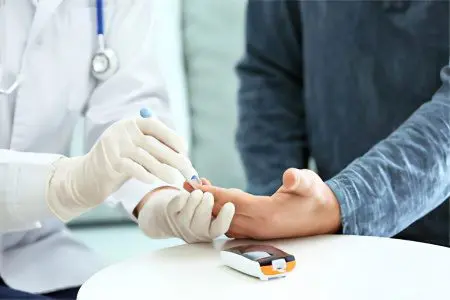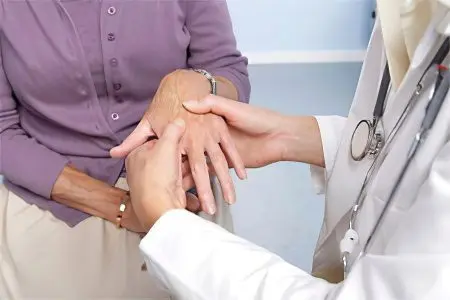Contents
Numbness of the hands and feet often worries people of all ages. This feeling may be accompanied by tingling, crawling, decreased sensitivity, pain. This combination of symptoms is called paresthesia. Most often, numbness of the limbs is a physiological phenomenon, that is, it is not dangerous. However, sometimes this symptom can indicate a serious illness. To find out the cause of regular hand numbness, you need to consult a doctor.
Causes of numbness

Both physiological and pathological factors can provoke numbness of the hands.
Temporal or physiological factors
Physiological (temporary) causes of numbness include:
Long pastime in a pose when one arm is thrown over the armrest. This leads to pressure on the nerve endings, which causes some discomfort.
Carrying a heavy bag or backpack. The pressure in this case will be exerted by his straps. Numbness occurs against the background of a violation of the blood supply to the limb.
Wearing too tight clothes.
Frequent raising of the arms above the shoulders.
Long periods of time spent in the cold. Numbness occurs due to vasospasm.
All of these factors do not pose any threat to health. To prevent numbness, you need to change your position more often, massage a limb, do light gymnastics, change the position of a backpack or bag. The danger is pathological causes leading to numbness of the hands.
Pathological factors
Fingers can become numb due to compression of nerve endings and blood vessels in the wrist area. Connective tissue can put pressure on them. If the numbness disappears quickly after a change in posture, or after rubbing the tissues, then this symptom can be ignored. Provided that numbness occurs frequently, persists for a long time, and it is not possible to cope with it with massage and a change in posture, you need to contact a doctor. Such a symptom may indicate an infringement of the nerve fibers, or a violation of the blood supply to the tissues.
The reasons can be very serious. Among them:
Polyneuropathy. This pathology is accompanied by damage to the nerve trunks of the peripheral nervous system. In addition to numbness, the patient will develop hand weakness, their tissues will begin to atrophy, that is, dry out. The patient suffers from cuts (partial movement disorder). Sometimes paralysis is observed, that is, the functions of the limb will be completely lost. The cause of polyneuropathy may be diabetes mellitus, alcoholism, diphtheria, hemoblastosis, porphyria, periarteritis nodosa, systemic lupus erythematosus.
Stroke. With this pathology, there is a violation of the nutrition of the brain. Limb numbness is most often caused by ischemic stroke. People’s hands become numb at rest, tingling occurs in them.
Neuroses.
Shingles.
Damage to the nerve nodes of various parts of the spine. The cervical, shoulder, lumbosacral region may suffer. With such pathologies, in addition to numbness, a person will suffer from pain. It will be localized in those places for the innervation of which the affected nerve plexuses are responsible. The most common pathology is osteochondrosis.
Median nerve syndrome. This pathology is called pronator syndrome, carpal tunnel syndrome, etc. Numbness occurs according to the “monkey hand” type. The surface of the first finger from the side of the palm suffers and completely the 2nd, 3rd and 4th finger of the hand.
Damage to the ulnar and radial nerve, which can be observed with Turner’s syndrome and other pathologies.
Vascular lesion. Often obliterating endarteritis leads to numbness. With this pathology, microcirculation in small blood vessels is disturbed. This happens against the background of their spasm. Numbness resembles a clinic of osteochondrosis.
Raynaud’s disease. Numbness occurs in the hands and feet. It appears paroxysmal, the cause is a violation of blood circulation in the vessels. Raynaud’s disease can be inherited, severe stress can provoke its manifestation.
Vitamin deficiency. Numbness develops in people whose body lacks B vitamins, namely, thiamine, folic acid, cyanocobalamin. Also, numbness can develop against a background of vitamin E deficiency.
Vibration disease. Numbness is a companion of people who often experience vibrations. In addition to regularly receiving microscopic injuries, pathological reflexes are formed in such individuals. This causes pain and numbness.
Received injuries. It can be fractures, bruises, dislocations. All of them contribute to the violation of the integrity of the nerves. This leads to characteristic symptoms.
Taking certain medicines. Numbness is a side effect. It is available in antibacterial drugs and chemotherapy agents.
symptomatology

The symptoms of hand numbness largely depend on what exactly caused this violation.
Common signs of numbness:
Weakness in limbs.
Inability to hold an object.
Tingling sensation in the fingers.
Crawling sensation.
The appearance of “goose bumps”.
Feeling of coldness of the limb.
If after 2-3 minutes the unpleasant symptoms do not disappear, then a pathological cause of numbness can be suspected.
When it develops against the background of diabetes, the patient will experience symptoms such as:
Numbness in other parts of the body.
Great thirst, dry mouth.
Frequent urge to empty the bladder.
Visual impairment.
If a person has diseases of the joints and spine, then in addition to numbness, he will be haunted by symptoms such as:
Pain in body and limbs.
Numbness at night. It occurs even with a comfortable sleeping position.
Morning stiffness.
Weak muscle tone.
Tingling in the palms.
Finger numbness.
When is it necessary to see a doctor?

Numbness as a symptom should not be ignored. Sometimes it becomes the first sign of the development of a serious illness. Numbness is often associated with a stroke. Therefore, you should not hesitate to contact a specialist. With frequent numbness, you need to contact a neurologist.
When to visit a doctor:
There is no way to explain why the numbness occurs.
There are painful sensations in the forearm, in the fingers, in the neck.
Increased urge to urinate.
A rash appears on the body or on the limb.
Numbness is accompanied by dizziness, muscle dysfunction and other symptoms.
Large areas of the body are involved in the pathological process.
The numbness is bilateral.
Which doctor treats hand numbness?

If you experience numbness, you need to contact a neurologist. The doctor will examine the patient, clarify his complaints, and assess the presence of other neurological signs.
If the doctor considers it necessary, he will refer the patient to other narrow specialists:
Patients with vasculitis and Raynaud’s disease are referred to a rheumatologist.
People with suspected cardiovascular disease are referred to a cardiologist.
Patients with diabetes mellitus are referred to an endocrinologist.
Patients with injuries and tumors are referred to a neurosurgeon.
Patients with diseases of an infectious nature are referred to an infectious disease specialist.
Patients who have been intoxicated with harmful substances at the workplace are referred to an occupational pathologist.
Diagnosing the problem

The reception of the patient begins with a survey, which is of no small importance in the diagnostic plan. Careful history taking allows the doctor to suspect the causes of hand numbness. After the interview, the doctor proceeds to examine the patient. In the course of its implementation, it is important to assess the color of the skin, its temperature, tendon reflexes, skin reflexes.
Based on the data received, the doctor directs the patient for further examination, which may include:
Blood donation for general and biochemical analysis.
Urine for general analysis.
Ultrasound of internal organs.
Radiography of the skull and spine. The study is prescribed if there is a suspicion of an intervertebral hernia or other disorders in the functioning of the musculoskeletal system.
Vascular angiography with contrast.
CT. This study provides maximum information about the state of the organs. With its help, hematomas, aneurysms, blood clots, circulatory disorders, etc. are detected.
MRI. It is prescribed in the case when the doctor suspects that the vessels are being clamped.
Electroneuromyography. This study allows you to identify a violation of innervation. Diagnosis is carried out using special electrodes.
After the patient has passed the necessary examinations, the doctor will be able to give him an opinion on the state of health and prescribe the appropriate treatment.
Hand numbness treatment

To cope with numbness of the hands, the doctor prescribes complex treatment. Therapeutic measures include therapeutic exercise complexes, as well as certain procedures. They are aimed at improving tissue nutrition and increasing blood circulation in the limbs.
Possible treatment options:
Physiotherapeutic effect on the body: phonophoresis and electrophoresis. Thanks to these procedures, blood flow is activated, so drugs penetrate better into damaged tissues.
Manual therapy The study of active points allows you to get rid of excess pressure on the nerve endings. Muscle spasm goes away, articular blockades are removed.
Exercise therapy. The development of the complex should be carried out by a professional.
Medical treatment
The doctor will be able to choose effective drugs only after the diagnosis is made. Only medication correction is not enough to cope with the problem. It will be necessary not only to take medicines, but also to undergo physiotherapeutic measures, perform exercise therapy, etc.
Drug correction is based on drugs to relieve inflammation. Also, the treatment regimen includes chondroprotectors, analgesics, vasodilators.
To improve the condition of nerve fibers, accelerate metabolic processes in the nervous tissue, a course of vitamins is recommended: B1, B6 and B12.
diet therapy
Patients with hand numbness require a diet enriched with vitamins and proteins. Be sure to have fresh vegetables on the table: cabbage, carrots, herbs, salads. Let’s not forget the beans.
You should give up cocoa and coffee. Preference should be given to green tea, herbal drinks, mint tea.
Meat and fish should not be too fatty. Minimize the consumption of smoked meats and fried foods. Chicken eggs are eaten 2-3 times a week. Cakes and pastries fall under the restriction.
[Video] Dr. Evdokimenko, rheumatologist and psychophysiologist, academician of the Russian Academy of Medical and Technical Sciences, will tell you why hands or fingers go numb:









